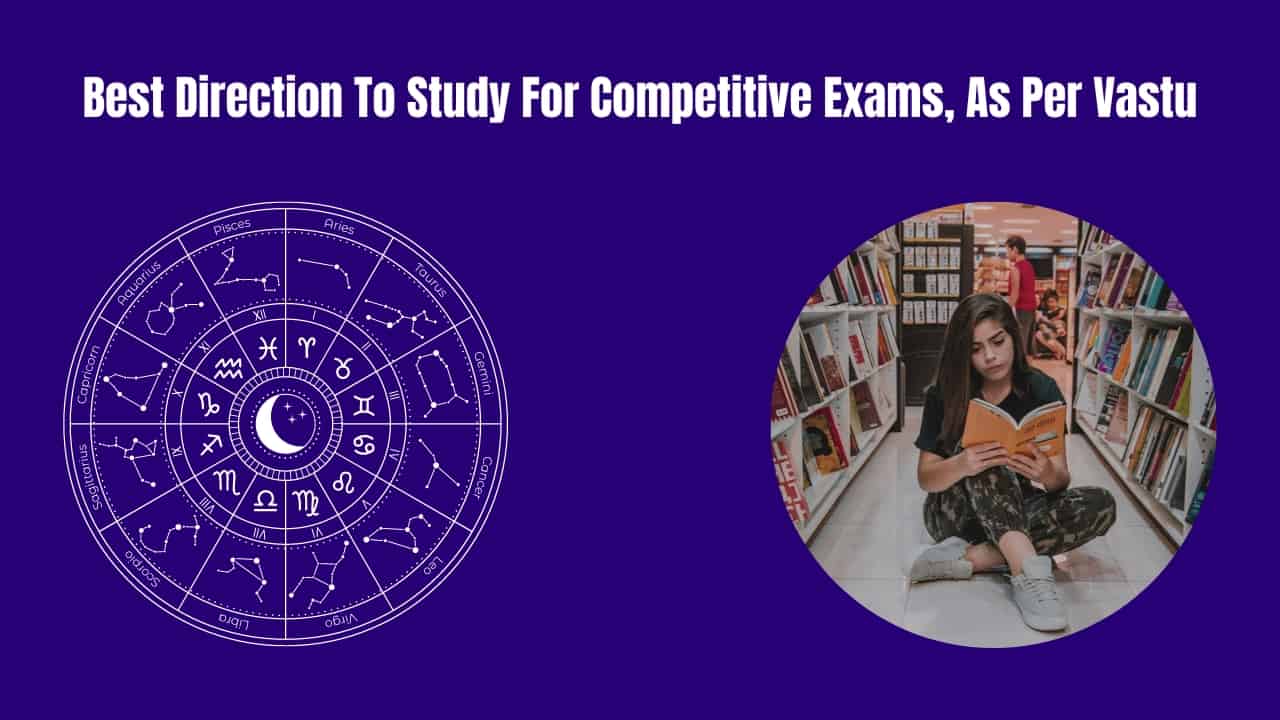Best Direction To Study For Competitive Exams: The significance of direction during research has yet to be established by science. The effect on variables, including personal study methods, focus, and study atmosphere, is more significant.
Individual beliefs may affect the study’s course but have little bearing on the outcome. Here, Let’s see the best direction to study for competitive exams.
Here are various things related to competitive exams one should know. Get to learn about directions and tips related to competitive exams.
Best Direction To Study For Competitive Exams, As Per Vastu
Each orientation connects to particular spirits and components following Vastu Shastra, a classical Indian building discipline. Some people consider these recommendations when designing their study environments, even though they are founded on societal concepts rather than having a clear scientific foundation. According to Vastu, the following suggestions are the best direction to study for competitive exams:

North-East (Ishaan) Direction
According to Vastu Shastra, the northeast direction links to knowledge, insight, and spirituality. It is frequently thought to be the best direction for research regions. Setting up a work or study surface in the northeast section of the space will improve your focus, recall, and simplicity of thought. Make sure to study in that manner when facing east.
East (Poorva) Direction
The east (Poorva) direction denotes fresh starts and awareness because it connects to the sunrise. Orienting your study space towards the east helps foster positive vibes, imagination, and cognitive growth. It is alleged that studying with your back to the east can help you concentrate better.
North (Uttar) Direction
The North is thought to bring prosperity and advancement. Whenever studying, make sure you are facing north or that the study surface is facing north. Reading in the north direction might improve memory and encourage academic performance.
West (Paschim) Direction
Although the west (Paschim) direction isn’t considered as suitable for learning as the other directions, it continues to be utilized successfully. When studying this particular orientation, remember that you gaze east to take advantage of the uplifting energy the rising sun brings. You may set up a study place in the west if the opposite orientations could be more practical.
It’s crucial to remember that Vastu’s advice shouldn’t be considered an assurance for achievement in competitive exams but rather an addition to your general study regimen. Acquiring educational targets eventually requires individual effort, efficient study methods, and an organized study style.
Best Study Surroundings
Here are a few general guidelines to create the best study surroundings, along with taking the orientation into account:
- Reduce distractions: Guarantee that your research space lacks noise, digital gadgets, and extraneous clutter.
- Good lighting: To stay attentive and avoid eye fatigue, read in an area with adequate illumination. When feasible, employ natural light; if impossible, use appropriate artificial lighting.
- Employ an ergonomic chair and have proper posture when reading to prevent discomfort in the body and foster concentration.
- Well-ventilated environment: To guarantee a constant flow of blood oxygen & for optimal focus, read in an adequately ventilated space or region.
- Personalised organization: Arrange your educational resources and supplies according to your preferred learning methods. Maintain your study space organized and focused-friendly.
Always keep in remembering that a perfect learning setting involves one which matches your tastes and level of comfort. It’s critical to locate a location to study and focus without distractions.
The best direction to study for competitive exams as per scientific research
According to science, no path can improve learning or boost success in competitive tests. The quality of the study methods, method of study, focus, and desire are the leading personal elements that affect how well someone studies.
Nevertheless, some broad suggestions can improve the educational situation and are backed by studies in science:
Distraction-free & Quiet Conditions
Find a calm area so you may study without being disturbed or distracted. Noise will delight you and create problems in maintaining attention towards your studies. Problems & noise can interfere with learning and impair concentration.
Adequate Lighting
Study in an effectively illuminated room to prevent eye fatigue and keep yourself vigilant. When feasible, utilize sunlight, but if this isn’t possible, use appropriate artificial lighting.
Comfy Seating and Ergonomics
Make sure you’re using an inviting chair and a desk or table that is ergonomically constructed to encourage healthy posture. Concentration is improved, and physical strain is decreased through ergonomic assistance.
Proper Ventilation
Ensure a fresh flow of oxygen that can enhance cognitive performance and alertness while you study in a well-ventilated room. This helps you to remain active and will help adequately boost your brain.
Personalized Study Methods
Choose study methods that fit your learning preferences and put them to use. Some people find visual tools helpful, while others like aural or kinesthetic techniques. To determine which approach suits most yourself, check up a few.
Effective Time Administration
Outline and set aside time for studying, ensuring it is well-balanced and includes all relevant subjects. Take breaks and utilize the moment wisely to lessen stress.
Breaks and rest
It’s essential to take regular breaks throughout study sessions to stay focused and avoid being mentally exhausted. According to research, taking quick breaks for 5 to 10 minutes at regular intervals can increase retention and productivity.
Healthy Lifestyle Habits
Get adequate sleep, eat wholesome foods, and exercise frequently to preserve a life of equilibrium. These behaviors can improve your capacity to study and general well-being.
Learning Actively
Active learning techniques include summarising, explaining ideas to others, and resolving practice issues. Proactive studying techniques are preferable to passive studying or memorization of material. These methods improve learning and memory of the subject matter.
Periodic Practice
Regular practice and review are essential for consolidating knowledge and enhancing performance. Plan frequent study sessions to review the course material and practice the exam questions.
Although the scientific study offers insightful information, keep in awareness that each individual is different and that what applies to a particular individual might not be practical for else. It’s critical to try new things, pay attention to your study habits, and then implement changes based on what works best for you regarding understanding and remembering knowledge.
Practical Tips To Prepare For Competitive Exams
Competitive exam preparation requires a systematic and well-thought-out strategy. Following are some practical suggestions to aid in your excellent preparation:
Understand the Exam
Become familiar with the syllabus, grading policy, and examination format. Recognize the many sections and subjects that the examination covers. This will assist you in organizing your preparation plan.
Organize Your Study Time
Create a sensible study plan that enables thorough coverage of the course material. As often as you can, adhere to the program to ensure consistency. Establish dedicated time limits for each course or topic, and make sure your schedule is well-balanced.
Divide syllabus
Divide the course material into more manageable, smaller chunks. Each subject should be broken down into topics, and every issue should be covered in the study plan. Better understanding and memory of the information are benefits of this strategy.
Assemble reading material
Gather any materials for your studies, such as reference books, online databases, and test questions from prior years. Select trustworthy resources that follow the exam syllabus. Put your study materials in for quick access.
Practice past Year’s Papers
Completing past year specimen and examination questions is essential to comprehend the exam structure, discovering key concepts, and developing time management skills. It also offers you a sense of the kinds of questions that will be on the test.
Mock Tests
Regularly administer mock exams to simulate the setting of the real exam. Mock exams enable you to evaluate your development, pinpoint your abilities and shortcomings, and practice time management. Examine each test you took, and work on strengthening areas of weakness.
Use Proven Study Strategies
Use proven study strategies, including active learning, constructing mnemonics, producing flashcards, and summarising key ideas. These methods promote more extraordinary knowledge interpretation and retention.
Ask for Clarification
Ask teachers, coaches, or community members to seek explanations when there are concerns or trouble grasping a given idea. Confusion throughout the exam is avoided by promptly answering unclear questions.
Time Management
Establish efficient time management techniques. Sort your study material into categories depending on importance and degree of difficulty. Give difficult areas or subjects extra consideration yet allow sufficient opportunity for revision.
Taking Psychological And Physical Care
Take good care of your psychological and physical well-being to maintain good health. You may sustain a healthy lifestyle by obtaining adequate sleep, eating wholesome foods, and exercising frequently. Practice relaxation methods like meditating or taking deep breaths and avoid severe stress.
Revision
Revision should be done frequently to strengthen ideas and increase preservation. Set aside time for revising sessions, concentrating on crucial ideas, formulas, and details. For easy revision, make thought maps or brief remarks.
Maintain Your Motivation
Remain motivated while you work on your preparedness. Set attainable objectives, reward yourself when you reach significant milestones, and have a positive outlook. Make the educational atmosphere helpful & partake in experiences that will rekindle your motivation.
Success in competitive tests depends on consistency, perseverance, and self-confidence. Every person has a unique learning style and speed. Adapt these suggestions to your requirements and taste.
FAQs
- Is there a method to prepare for difficult examinations that has been scientifically proven effective?
No scientific proof exists that studying more effectively or performing better on examinations supports a particular approach. The quality of the study strategies, approaches to learning, focus, and desire are the leading personal elements that affect how well someone studies.
- What has Vastu Shastra to offer regarding the most effective study guidance?
An antique Indian architectural discipline called Vastu Shastra asserts that learning in the northeast (Ishaan) orientation is lucky. This is the best direction to study for competitive exams since it is linked to intelligence, learning, and spirituality. It’s crucial to remember that Vastu’s advice shouldn’t be viewed as an assurance of exam achievement but rather as an improvement on general study regimens.
- Can learning in a particular direction help with attention and concentration?
While having a tidy and comfortable study space, such as facing a specific direction, may be helpful to some people, the effect on focus and attention differs from individual to individual. Instead of relying exclusively on the instruction, it is additionally crucial to establish a study environment that is favorable to good study habits and free of distractions.
- What are a few guidelines for establishing the best possible study environment?
Distractions should be minimal, lighting should be appropriate, sitting should be comfortable, ventilation should be maintained, and study materials should be organized efficiently. Locating a peaceful area where you can concentrate without distraction is crucial.
- What other elements are crucial for productive study beyond the direction?
Even while learning in a particular manner might not make much of a difference, other aspects of good studying, including learning productive learning methods, creating a workable study timetable, practicing frequently, having paused for rest, and effective time management, are vital. Achievement in competitive tests also depends on leading a life of wellness, obtaining enough sleep, and remaining motivated.
Conclusion
In conclusion, there is not any proof for the contention that there is a particular “best direction” to prepare for competitive tests. Personal ideas may impact the direction, but successful study methods should be the primary concern. Personal study habits, focus, drive, and fostering a positive learning atmosphere are more important.
Keeping all these things in mind, we will give you details of some directions. This may help you choose the best approach to study for competitive exams.
Also Read:
